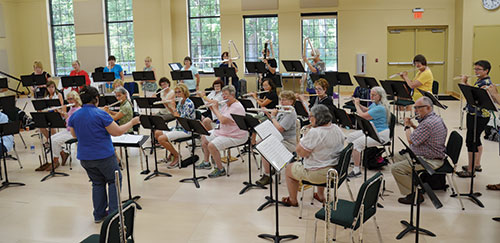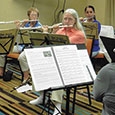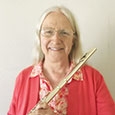Since 2005 I have attended 21 sessions of six different adult flute camps. At age 66, I enjoy flute camp as much as I did 50 years ago. Camp may not be the exact title of the event since some take place in a hotel. However, that is what my children call it when they ask, “Did you have fun at flute camp?” Adult flute programs are held throughout the U.S. and are designed for flutists ages 18 to 88 who are not preparing for auditions or a professional playing career but still want to improve. We love playing and want to learn more, for the joy of playing – no whatever level we are at.
I live in a small town in Louisiana. After graduating with a BA in music from Lebanon Valley College, I joined the U.S. Army as a Bandsman. After leaving the military, I still wanted to play my flute, but there were few opportunities around. Once my children were grown, I looked into summer programs.
For the adult amateur, regular lessons during the year may not be feasible due to scheduling or geography. Even regular practicing can be a challenge. Attending a summer flute camp provides concentrated instruction and playing time as well as motivation and encouragement to take back home for the rest of the year. For working adults, it may be more practical to take a few days or a week’s vacation to attend a camp than to fit in weekly lessons or group rehearsals throughout the year.
Flute camp teachers, conductors, and coaches introduce new and different pedagogical ideas about playing concepts, exercises and warmups. My primary teacher as a young flutist was a student of William Kincaid. Through my summer study, I have been introduced to the concepts of Geoffrey Gilbert, Marcel Moyse, Frances Blaisdell, Joseph Mariano, Julius Baker, Michel Debost, and others. These classes help me keep up with current ideas and trends in flute pedagogy and music. Occasionally ideas offered conflict with what I was taught. That is okay. I can consider a different approach, try it, and decide to incorporate it into my playing and practice routine or not. Regardless, I have learned something in the process.
I also learn from fellow campers who may have different flute backgrounds and experiences. At my first flute camp, I was aware in the group session that others were more familiar with some of the concepts. Sitting next to them helped me to figure these ideas out as we played. In class or rehearsal, others may ask a question that never occurred to me – or did, but I did not want to ask! Whether it is sharing a “my teacher told me” hint or a special fingering, other campers also become my teachers.
.jpg)
Courtesy of Portland Flute Spa and Flute Choir Retreat, Phyllis Avidan Louke
Campers come from all parts of the country or even from other countries. Many have non-music jobs and different experiences. I am enriched as a person and as a musician by getting to know them. Playing together, talking over meals or during breaks, or having serious nighttime discussions are all a part of flute camp. Sometimes my family or friends ask me if I will know anybody at an upcoming flute camp. I usually reply, “Maybe, but everybody there plays the flute. I know we will have that in common. Besides flutists are nice people.” I have made many special flute friends over the years.

Photo courtesy of Interlochen Adult Flute Camp by William Aikman
Some camps include a vendor who provides an opportunity to try out and purchase instruments, music, and accessories. Even if you do not buy, it is a chance to see what is available and new in the flute world.
Not all adult music camps include ensemble playing, but the ones I attend do. I live in a small town next to an army base. Over the years, I have sometimes had an army wife as a flute duet buddy, but often I am the only adult flute player in the community. I really look forward to my summer camps as an opportunity to play with other flutists. This is not only fun; it is necessary for my further development. You cannot learn ensemble skills by yourself.
For those blessed with more opportunities to play in a group throughout the year, ensembles at a summer camp give the chance to play with different players, be introduced to new repertoire, and experience a variety of teachers and conductors in a new environment. Often flute camps offer the opportunity to try the low flutes. I have found fellow campers to be very generous with not only loaning me their big flute, but also with giving helpful hints for playing it.
Free time in the schedule allows the opportunity to play informal duets or trios. Playing with a more experienced and skilled player is a great challenge and can be a good learning opportunity. Playing with a less-experienced player can be a nice boost to one’s self-esteem and an opportunity to give back by helping another. Being the stronger player has its own ensemble challenges and can lead to growth as a musician.
Some flute campers look for nearby programs for practical reasons. For me, flying across the country to a new location is part of the appeal. Living in hot and humid Louisiana, I enjoy the chance to spend a few days each summer in a more humane climate. Although flute camp is not a tourist trip, sampling local cuisine and seeing the local sights can extend the learning. I also combine a visit with my sister when I come to her state each year, and she enjoys attending our performances.
This summer I will again be heading off cross-country to play with new and old flute friends, learn and develop as a flutist, and of course, get away from the humidity at home!






